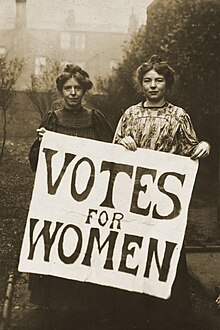Women's rights
Women are part of society. The society they are in expects that they do certain things, or they behave in certan ways. They have obligations. Much as they have obligations, they also claim to have certain rights.These rights are called women's rights. The claims are the basis for the women's rights movement in the 19th century and the feminist movements during the 20th and 21st centuries. In some countries, these rights are institutionalized or supported by law, local custom, and behavior. In others, they are ignored and suppressed. They differ from broader notions of human rights through claims of an inherent historical and traditional bias against the exercise of rights by women and girls, in favor of men and boys.[1]

The idea what rights women and girls have has changed over time. It is also different, in different parts of the world. Today, girls and women generally want the following rights:[2]
- Bodily integrity, their body belongs to them.
- Autonomy, they are free, and within certain limits can decide what to do.
- They are not subjected to violence, especially not Sexual violence
- They are able to work outside the household, and they will get recognition for the work they do.
- When they reach a certain age, they want to be able to vote, and to be elected. This is generally called women's suffrage
- They want reproductive rights. Usually this means they want to decide if they have children, and with who they have them. This is usially called family planning. They also want to have access to birth control (also called contraception), and the right to abortion.
- When it comes to law, there should not be a difference between a man and a woman.
- The want the right to own property.
- They want the right to get an education
Even today, societies are different: In many societies, women do not get all of these rights. Some of these rights are also subject to a lot of discossion. The Abortion debate is about if women should get the right to abortion and under what circumstances. Similarly, in certain societies, men have a lot of power. Such societies are called paternalistic. Violence against women may be commonplace, and the state will not do much against it.
References
change- ↑ Hosken, Fran P., 'Towards a Definition of Women's Rights' in Human Rights Quarterly, Vol. 3, No. 2. (May 1981), pp. 1–10.
- ↑ Lockwood, Bert B. (ed.), Women's Rights: A "Human Rights Quarterly" Reader (Johns Hopkins University Press, 2006), ISBN 978-0-8018-8374-3.